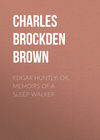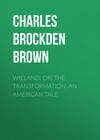Читать книгу: «Edgar Huntly; or, Memoirs of a Sleep-Walker», страница 3
Что-то пошло не так, попробуйте зайти позже
Покупайте книги и получайте бонусы в Литрес, Читай-городе и Буквоеде.
Участвовать в бонусной программеВозрастное ограничение:
0+Дата выхода на Литрес:
01 марта 2019Объем:
340 стр. 1 иллюстрацияПравообладатель:
Public Domain




















